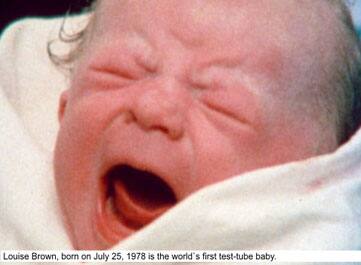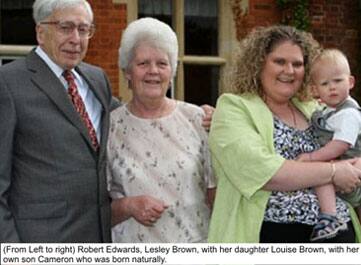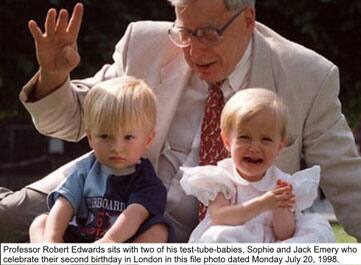
Liji Varghese
A Nobel laureate, Sir Robert Geoffrey Edwards has been credited with bringing hope to the lives of millions of couples unable to conceive naturally, through in-vitro fertilisation (IVF) technology which he co-pioneered with his colleague Dr Patrick Steptoe in 1978.
Born in Batley, Yorkshire, Robert Geoffrey Edwards studied at the Manchester Central High School between 1936-1944, before serving in the Army in Palestine, Jordan and Egypt. He received a doctorate in 1955, studying animal genetics at the University of Edinburgh. In 1963, he joined the University of Cambridge, where he studied human fertilization.

Despite hostility from the Vatican, refusal of funds from the British government and criticism from within the scientific fraternity, Sir Edwards along with Dr Steptoe, a gynecologic surgeon from Oldham, England, were successful in fertilizing human eggs outside the body for the first time in 1968.
The duo began placing fertilized embryos into infertile women in 1972. However, initial trials failed as the hormone treatment given to women to induce ovulation was making the uterus inhospitable for the embryos to survive. In 1977, the flawed treatment was done away with and the pair, instead, relied on the one egg that woman produced naturally every month.

The following year on July 25, Louise Brown, the world`s first test-tube baby was born at Oldham General Hospital, Oldham, by planned Caesarean section, heralding a new era of fertility treatment. Lesley Brown, the mother of the first test-tube baby, was facing a complication of blocked fallopian tubes and had been trying to conceive for almost nine years.
The birth of Louise silenced many critics who thought creating babies through IVF would result in birth defects. Many long-term studies have shown that children born through in-vitro are as healthy as those born through natural process.
Sir Edwards was awarded Nobel Prize for the development of IVF in 2010. However, his colleague Dr Steptoe, who died in 1988, did not receive the prize as Nobel is not awarded posthumously. Sir Edwards was knighted in 2011 by Queen Elizabeth for services to human reproductive biology.

The Catholic Church , which had been extremely hostile to the idea of babies being born in laboratories than through natural conception, called the Nobel Committee`s decision to honour Sir Edwards as `completely inappropriate `.
Ignazio Carrasco de Paula, president of the Pontifical Academy for Life, said in a statement after the Nobel panel`s announcement, “Without Edwards there wouldn’t be a market for oocytes (immature egg cells), without Edwards there wouldn’t be freezers full of embryos waiting to be transferred in utero or, more likely, to be used for research or to die abandoned and forgotten by everyone.”
The IVF technology that many a times results in discarding embryos has been described as “dynamic of violence and domination” by the Church.
Despite all the criticism, IVF - a procedure in which the embryos are created in laboratory before being transferred into a woman - has been considered a milestone in modern science that has brought hope to those unable to conceive naturally. So far, over 5 million children have been born around the world through IVF.
The IVF pioneer breathed his last on April 10, 2013 after a prolonged battle with a lung ailment at his home in Cambridge.






